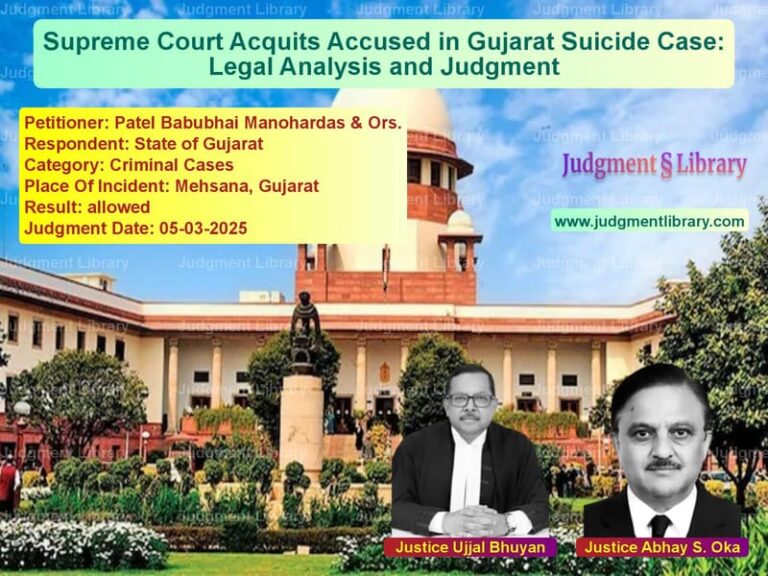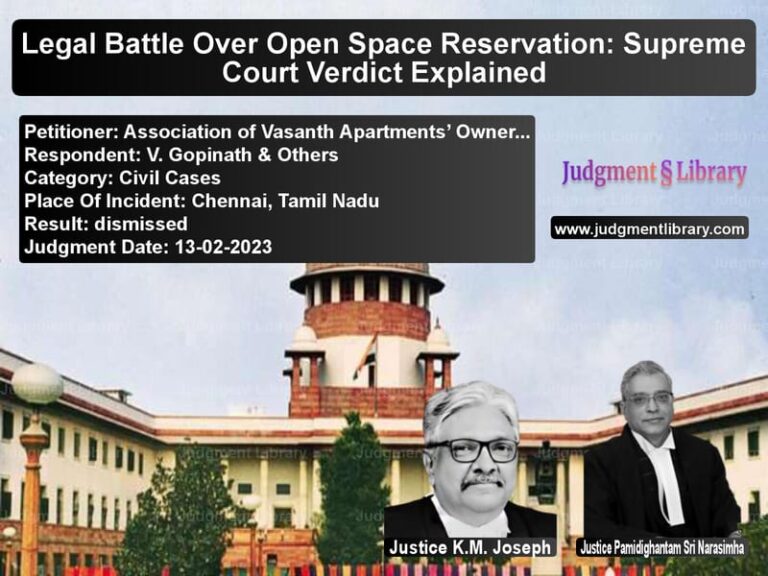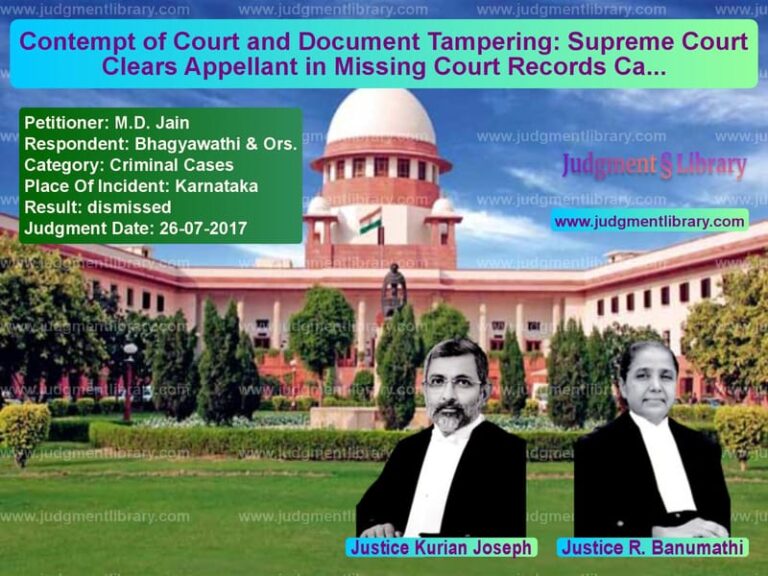Supreme Court Upholds Cheque Bounce Conviction: Fine Increased, Jail Term Waived for Elderly Accused
The Supreme Court of India has ruled in Sri Sujies Benefit Funds Limited vs. M. Jaganathuan, upholding the conviction of the accused under Section 138 of the Negotiable Instruments Act, 1881 for cheque dishonor. However, considering the advanced age of the accused, the Court modified the sentence, waiving the one-year simple imprisonment but increasing the fine payable to the complainant.
The ruling clarifies that a bounced cheque is presumed to be for a legally enforceable debt unless the accused successfully rebuts this presumption. The judgment restores the trial court’s order but modifies the penalty to accommodate the accused’s circumstances.
Background of the Case
The dispute arose over a series of loans granted by the complainant, Sri Sujies Benefit Funds Limited, to the accused, M. Jaganathuan, between 1995 and 1997. The key facts are:
- The accused, a subscriber of the complainant’s chit fund scheme, borrowed multiple amounts totaling Rs. 21,09,000 (including interest).
- To partially discharge the debt, he issued Cheque No. 0150573 dated 03.02.2003 for Rs. 19,00,000, drawn on Indian Overseas Bank.
- The complainant presented the cheque on 04.02.2003, but it was returned on 05.02.2003 with the endorsement ‘Account Closed.’
- A statutory notice was issued on 20.02.2003, but the accused denied the debt in his reply on 27.02.2003.
- The complainant filed a case under Section 138 of the Negotiable Instruments Act, 1881 before the Judicial Magistrate Court, Coimbatore.
Legal Issues Considered
The Supreme Court examined the following key legal questions:
- Did the accused successfully rebut the presumption under Sections 138 and 139 of the N.I. Act?
- Was the cheque issued for a legally enforceable debt?
- Was the acquittal granted by the Appellate Court justified?
- Should the punishment be modified considering the accused’s age?
Arguments by the Appellant (Sri Sujies Benefit Funds Limited)
The appellant, represented by counsel B. Ragunath, contended:
- The accused admitted to issuing the cheque, triggering a presumption that it was for a legally enforceable debt.
- The accused failed to provide sufficient evidence to rebut this presumption.
- The Appellate Court wrongly relied on minor discrepancies in the rate of interest to acquit the accused.
- Once a cheque is dishonored, the onus shifts to the drawer to prove that no liability existed.
Arguments by the Respondent (M. Jaganathuan)
The respondent, represented by Senior Counsel S. Nagamuthu, countered:
- The cheque was not issued for a legally enforceable debt but was post-dated and issued as security.
- The complainant applied an excessive interest rate, making the debt invalid under the Tamil Nadu Prohibition of Charging Exorbitant Interest Act, 2003.
- Multiple receipts showed that substantial repayments had already been made.
- The accused was 86 years old, living with his elderly wife, and sending him to jail would be unjust.
Supreme Court’s Observations
1. Cheque Bounce Creates a Presumption of Debt
The Court ruled that the accused’s admission of issuing the cheque triggered a presumption under Sections 138 and 139 of the N.I. Act.
“The burden was on the accused to prove that there was no legally enforceable debt. Mere allegations of excessive interest do not disprove the liability.”
2. Failure to Rebut the Presumption
The Court held that the accused did not produce sufficient evidence to dislodge the presumption.
“The accused neither produced a receipt showing full repayment nor filed a civil suit challenging the debt. The plea of excessive interest was not raised before issuing the cheque.”
3. Impact of the Tamil Nadu Act
The Court found that even if the Tamil Nadu Act applied, it did not invalidate the principal debt.
“The accused could have challenged the interest calculation separately. However, the cheque itself represented a debt that remained unpaid.”
4. Mitigating Factors: Age of the Accused
Considering the accused’s age, the Court waived the one-year imprisonment but increased the fine.
“The respondent is 86 years old, living with his elderly wife and without issue. In these circumstances, imprisonment is waived, but financial compensation is necessary.”
Final Judgment
The Supreme Court ruled:
- The appeal is allowed, and the High Court’s judgment is set aside.
- The conviction under Section 138 of the N.I. Act is restored.
- The accused must pay a fine of Rs. 28,50,000 (one and a half times the cheque amount).
- The jail sentence of one year simple imprisonment is waived, subject to payment of the fine within eight months.
- If the fine is not paid, the jail sentence will be reinstated.
Implications of the Judgment
This ruling has significant implications for cheque bounce cases:
- Clarifies Burden of Proof: Once a cheque is dishonored, the accused must prove that no debt existed.
- Protects Lenders: Ensures that borrowers cannot escape liability by making unsubstantiated claims of repayment.
- Balances Justice with Compassion: The Court considered humanitarian grounds while modifying the sentence.
- Encourages Financial Discipline: The ruling reinforces the importance of honoring financial commitments.
The Supreme Court’s decision in Sri Sujies Benefit Funds Limited vs. M. Jaganathuan upholds the integrity of financial transactions while balancing legal principles with compassion for elderly individuals.
Petitioner Name: Sri Sujies Benefit Funds Limited.Respondent Name: M. Jaganathuan.Judgment By: Justice Hima Kohli, Justice Ahsanuddin Amanullah.Place Of Incident: Coimbatore, Tamil Nadu.Judgment Date: 12-08-2024.
Don’t miss out on the full details! Download the complete judgment in PDF format below and gain valuable insights instantly!
Download Judgment: sri-sujies-benefit-f-vs-m.-jaganathuan-supreme-court-of-india-judgment-dated-12-08-2024.pdf
Directly Download Judgment: Directly download this Judgment
See all petitions in Fraud and Forgery
See all petitions in Cheque Dishonour Cases
See all petitions in Debt Recovery
See all petitions in Judgment by Hima Kohli
See all petitions in Judgment by Ahsanuddin Amanullah
See all petitions in allowed
See all petitions in Modified
See all petitions in supreme court of India judgments August 2024
See all petitions in 2024 judgments
See all posts in Criminal Cases Category
See all allowed petitions in Criminal Cases Category
See all Dismissed petitions in Criminal Cases Category
See all partially allowed petitions in Criminal Cases Category







